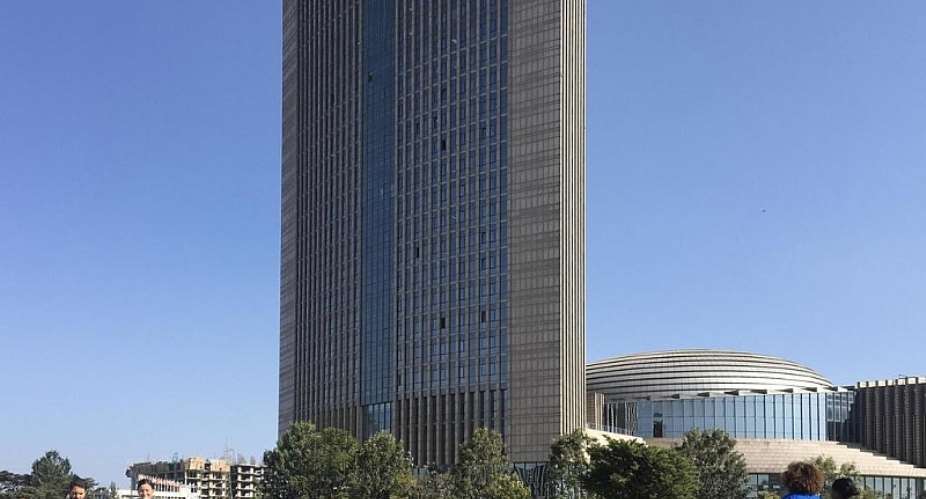The 33rd African Union Summit wrapped up in the Ethiopian capital after much delay, with promises to further advance the agenda on African solutions to African problems all in the name of silencing the guns across the continent.
The goal is to take the declarations off the podium and put them into action.
This includes the vision of making peace a reality for African people.
But the reality for many is in fact living through conflict, or living in places where policing authorities are highly armed, making the notion of 'Silencing the Guns' hard to fathom.
That's not to say, however, developments have not taken place during this Summit.
Libyan civil war
Since the ousting and then death of Libya's longtime leader Muammer Qadafi, the country has fallen into a perpetual state of civil war since 2014 fueled by militias loyal to Qaddafi, loyal to Fayez el-Saraj and loyal to Khalifa Haftar.
The internationally recognized government headed by Saraj versus the self-proclaimed government in the east of the country headed by Haftar are two main rival camps.
Many saw last year's rotating chairperson, Egypt's Abdelfattah al-Sisi, to have created much division within the AU as he supported the camp headed by Haftar, and the African Union (AU) has traditionally supported the one headed by Saraj.
Inter-Libyan forum
Delegations from both sides attended the lead-up to the Summit, agreeing to an inter-Libyan forum.
The caveat to the creation of this force is the ceasefire.
The United Nations in Geneva is waiting for a vote to finalize a ceasefire. UN chief Antonio Guterrej said earlier on Tuesday he believes this will happen very soon.
Once that has been formalized, then the forum will be held, though the location is under discussion.
Algeria has been involved in the negations and insists that it be held in Algeirs, others want to see it in Addis Ababa, since it is considered neutral ground.
Location aside, one point everyone has agreed to is the inclusion of all camps; not just those of Saraj and Haftar, but to open it up to those from the Qaddafi camp and civil society groups.
African involvement
“When the cessation of hostilities becomes officially signed, we want to join the UN [United Nations Support Mission in Libya, UNSMIL] in an assessed mission in Libya to evaluate what is necessary to oversee, to make sure the cessation of hostilities is respected by everybody. And we want also to be part of the observer deployment mission in Tripoli and elsewhere in the country where it is needed,” said Smail Chergui, the AU Commissioner of Peace and Security.
This support from the AU is to undo the feeling of being slighted in all previous mediating efforts pertaining to Libya that have been primarily outside of the continent.
Chergui added that in addition to a ceasefire and the continued enforcement of the arms embargo to Libya, the AU is demanding an “immediate cessation of all external interventions and interferences in Libyan affairs.”
South Sudan
Following its creation in 2011, fighting erupted in 2013, between President Salva Kiir and his former vice-president Riek Machar.
The two are on a tight deadline towards major progress in establishing a national unity government before its deadline of 22 February.
On Saturday Kirr and Marachar met, separately, with South African President Cyril Ramaphosa, the new chairperson of the African Union.
And on Sunday, both met with Uganda's President Yoweri Moseveni and Sudan Prime Minister Abdella Hamdok. It's worth noting given it was the first time they've met outside South Sudan since November 2019.
Sticking point
The problem in this round of talks is the sticking point of how many states South Soudan should have.
Initially South Sudan had 10 states, but in 2017, Kiir went ahead and unilaterally created 32 states.
Machar refuses to agree to a national unity government without addressing this problem, but Kiir believes they can agree to the government and return to this detail later on.
The regional bloc, IGAD (Intergovernmental Authority on Development) and South Africa's vice president David Mabuza, have allegedly become frustrated with this round of negotiations.
In an effort to move things alone, a source here has told RFI that IGAD will likely propose a return to 10 states so the deadline for the national unity government can be kept.





 2024 election will be decided on the grounds of the economy; choice of running m...
2024 election will be decided on the grounds of the economy; choice of running m...
 Dumsor: We're demanding less; just give us a timetable — Kwesi Pratt to ECG
Dumsor: We're demanding less; just give us a timetable — Kwesi Pratt to ECG
 Do I have to apologise for doing my security work, I won’t – Simon Osei-Mensah r...
Do I have to apologise for doing my security work, I won’t – Simon Osei-Mensah r...
 Prestea and Bogoso mines: Complete payment of outstanding salaries not later tha...
Prestea and Bogoso mines: Complete payment of outstanding salaries not later tha...
 NDC postpones Prof. Opoku-Agyemang entry tour to May
NDC postpones Prof. Opoku-Agyemang entry tour to May
 All my businesses have collapsed under Akufo-Addo — NDC Central regional chair
All my businesses have collapsed under Akufo-Addo — NDC Central regional chair
 Military, Prison Officers clash in Bawku, three injured
Military, Prison Officers clash in Bawku, three injured
 GRA-SML contract: MFWA files RTI request demanding KPMG report
GRA-SML contract: MFWA files RTI request demanding KPMG report
 Court threatens to call second accused to testify if NDC's Ofosu Ampofo fails to...
Court threatens to call second accused to testify if NDC's Ofosu Ampofo fails to...
 Family accuses hospital of medical negligence, extortion in death of 17-year-old...
Family accuses hospital of medical negligence, extortion in death of 17-year-old...
